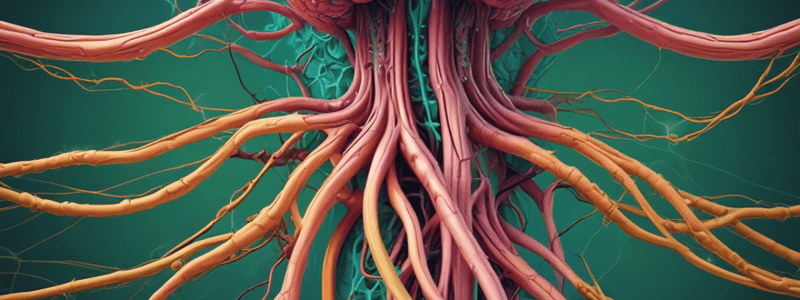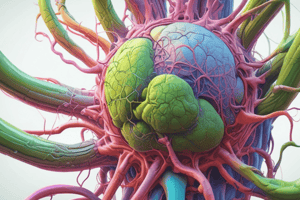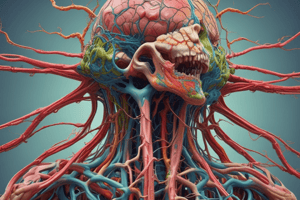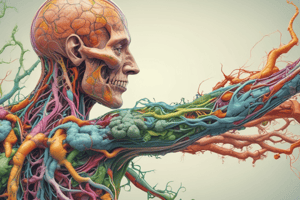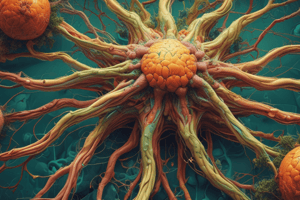Podcast
Questions and Answers
What is the main function of the lymphatic system?
What is the main function of the lymphatic system?
- Transporting excess fluid to the bloodstream (correct)
- Producing red blood cells
- Absorbing glucose from the diet
- Destroying pathogens
How does lymph mainly move through the lymphatic vessels?
How does lymph mainly move through the lymphatic vessels?
- By nerve impulses
- By muscle contraction, breathing, body movements (correct)
- By contraction of lymphatic vessels
- By heartbeat
Which area of the body does not have lymph vessels?
Which area of the body does not have lymph vessels?
- Bone marrow
- Intestines
- Skin
- CNS (Central Nervous System) (correct)
Which cell type coordinates the adaptive immunity in the immune system?
Which cell type coordinates the adaptive immunity in the immune system?
Which type of immune response is rapid but non-specific?
Which type of immune response is rapid but non-specific?
Where do all leukocytes, including myeloid and lymphoid cells, originate from?
Where do all leukocytes, including myeloid and lymphoid cells, originate from?
Which of the following is NOT a function of T cells?
Which of the following is NOT a function of T cells?
Where do B cells develop?
Where do B cells develop?
What is the primary function of Natural Killer cells?
What is the primary function of Natural Killer cells?
Which of the following is NOT considered a secondary lymphoid organ?
Which of the following is NOT considered a secondary lymphoid organ?
What happens to the thymus as a person ages?
What happens to the thymus as a person ages?
Which of the following is NOT a function of lymph nodes?
Which of the following is NOT a function of lymph nodes?
What is the primary function of the spleen?
What is the primary function of the spleen?
Which of the following statements about tonsils is NOT true?
Which of the following statements about tonsils is NOT true?
What is the primary function of MALT (mucosa-associated lymphoid tissue)?
What is the primary function of MALT (mucosa-associated lymphoid tissue)?
Which of the following is NOT a characteristic of lymphoid nodules?
Which of the following is NOT a characteristic of lymphoid nodules?
What is the primary function of germinal centers in lymph nodes and nodules?
What is the primary function of germinal centers in lymph nodes and nodules?
What is the primary function of bronchus-associated lymphoid tissue (BALT)?
What is the primary function of bronchus-associated lymphoid tissue (BALT)?
Which of the following is NOT a barrier defense mechanism?
Which of the following is NOT a barrier defense mechanism?
What is the primary function of neutrophils in the innate immune response?
What is the primary function of neutrophils in the innate immune response?
Which of the following is NOT a function of the complement system?
Which of the following is NOT a function of the complement system?
What is the primary function of prostaglandins in the inflammatory response?
What is the primary function of prostaglandins in the inflammatory response?
Which of the following is NOT a characteristic of the adaptive immune response?
Which of the following is NOT a characteristic of the adaptive immune response?
What is the role of major histocompatibility complex (MHC) molecules in T cell recognition?
What is the role of major histocompatibility complex (MHC) molecules in T cell recognition?
Which type of MHC molecule is expressed by all human cells?
Which type of MHC molecule is expressed by all human cells?
What is the role of autoimmune diseases in the adaptive immune response?
What is the role of autoimmune diseases in the adaptive immune response?
Which of the following is a function of perforins in the innate immune response?
Which of the following is a function of perforins in the innate immune response?
Which type of T cell regulates the activity of macrophages and other T cells?
Which type of T cell regulates the activity of macrophages and other T cells?
What is the process called where a mature T cell recognizes an antigen and divides rapidly by mitosis, leading to a strong immune response against a pathogen?
What is the process called where a mature T cell recognizes an antigen and divides rapidly by mitosis, leading to a strong immune response against a pathogen?
Which class of antibody is associated with allergies and anaphylaxis, and can cause mast cells to degranulate?
Which class of antibody is associated with allergies and anaphylaxis, and can cause mast cells to degranulate?
What is the process called where cells that bind to "self" cells are eliminated in the bone marrow during B cell maturation?
What is the process called where cells that bind to "self" cells are eliminated in the bone marrow during B cell maturation?
Which type of immune response is acquired by being exposed to a killed or weakened pathogen, stimulating the body to produce memory cells without suffering through an initial exposure?
Which type of immune response is acquired by being exposed to a killed or weakened pathogen, stimulating the body to produce memory cells without suffering through an initial exposure?
What is the process called where antibody levels rise in the blood as pathogen levels decline, and vice versa?
What is the process called where antibody levels rise in the blood as pathogen levels decline, and vice versa?
Which type of T cell secretes cytokines to enhance B cell differentiation into plasma cells that make antibodies?
Which type of T cell secretes cytokines to enhance B cell differentiation into plasma cells that make antibodies?
What is the process called where a pathogen is coated by antibodies, making it impossible for the pathogen to bind to a receptor, and forming the basis for protection due to vaccines?
What is the process called where a pathogen is coated by antibodies, making it impossible for the pathogen to bind to a receptor, and forming the basis for protection due to vaccines?
Which type of cell is responsible for killing the cause of leprosy by producing nitric oxide inside the macrophage?
Which type of cell is responsible for killing the cause of leprosy by producing nitric oxide inside the macrophage?
What is the process called where the antigen binds only to the T cell with the specific receptor for that antigen?
What is the process called where the antigen binds only to the T cell with the specific receptor for that antigen?
Flashcards are hidden until you start studying
